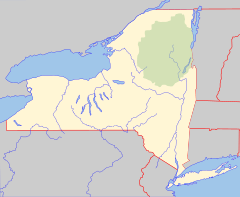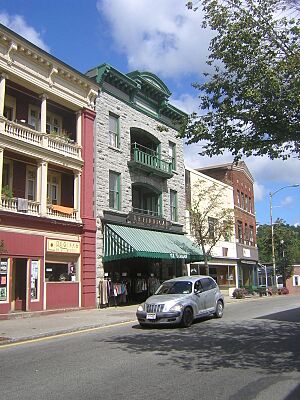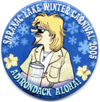Saranac Lake, New York facts for kids
Quick facts for kids
Saranac Lake, New York
|
|
|---|---|
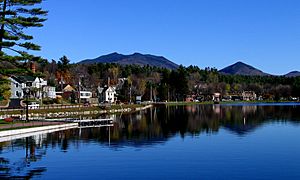
Lake Flower, from Riverside Park
|
|
| Nickname(s):
The Capital of the Adirondacks
|
|
| Country | United States |
| State | New York |
| Counties | Franklin, Essex |
| Towns | Harrietstown, North Elba, St. Armand |
| Government | |
| • Type | Mayor and Board of Trustees |
| Area | |
| • Total | 3.16 sq mi (8.18 km2) |
| • Land | 2.91 sq mi (7.54 km2) |
| • Water | 0.25 sq mi (0.64 km2) |
| Elevation | 1,545 ft (471 m) |
| Population
(2020)
|
|
| • Total | 4,887 |
| • Density | 1,678.80/sq mi (648.21/km2) |
| Time zone | UTC−5 (Eastern (EST)) |
| • Summer (DST) | UTC−4 (EDT) |
| ZIP Code |
12983
|
| Area code(s) | 518 |
| FIPS code | 36-65233 |
| GNIS feature ID | 0964482 |
Saranac Lake is a village in New York, United States. In 2020, about 4,887 people lived there. It is the biggest community in the Adirondack Park. The village gets its name from three nearby lakes: Upper, Middle, and Lower Saranac lakes.
Saranac Lake is special because it covers parts of three towns and two counties! These are Harrietstown, St. Armand, and North Elba (towns), and Franklin and Essex (counties). The village itself is not directly on the shores of the three Saranac Lakes. However, the northern part of Lake Flower, which is a wide section of the Saranac River, is inside the village. The village is about 9 miles (14 km) west of Lake Placid. Saranac Lake, Lake Placid, and Tupper Lake are known as the Tri-Lakes region.
Contents
History of Saranac Lake
The area where Saranac Lake is now was first home to Iroquoian-speaking people for hundreds of years. The Mohawk people used this land for hunting.
European Americans first settled here in 1819. The first family to arrive was the Jacob Smith Moody family. In 1827, Pliny Miller and Alric Bushnell built a logging facility with a dam and sawmill. The village grew around this spot. The first school was built in 1838. In 1849, William F. Martin built one of the first hotels in the Adirondack Mountains. It was called "Martin's" and was a popular place for hunters and social gatherings.
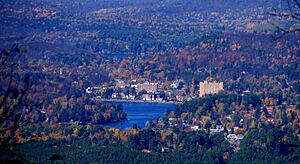
Dr. Trudeau and Cure Cottages
In 1876, Dr. Edward Livingston Trudeau came to Saranac Lake from New York City. He had tuberculosis (TB), a serious lung disease. At that time, doctors believed that fresh, dry, cold air could help patients. Dr. Trudeau found that the mountain air made him feel better. In 1884, he started his Adirondack Cottage Sanitarium. It began with a small cottage called "Little Red." This was the first "cure cottage." It was built on Mount Pisgah.
More patients, including the famous writer Robert Louis Stevenson, came to the area. Dr. Trudeau's sanitarium became very well known. Later, the Trudeau Institute, a medical research center, grew from his work. It now studies how our bodies fight off diseases.
Will Rogers Memorial Hospital
A man named William S. Fowler owned land near Saranac Lake. He built several "cure cottages" for people with TB. In 1919, an insurance company bought the land and made it a private hospital for their workers.
In 1925, the property was sold to the National Vaudeville Artists, a group for stage performers. Many vaudeville performers came to Saranac Lake for treatment. They built a large hospital called the Tudor Building, which is still there today.
After World War II, new medicines (antibiotics) were found to treat TB. This meant that mountain hospitals were no longer needed as much. In 1936, the Tudor Building became the Will Rogers Memorial Hospital, named after the famous entertainer. Later, the hospital closed because it was too old. The building was used for different things, like a nightclub and apartments. In 1980, it was used as the press center for the Winter Olympics. Today, it is a retirement home for older people.

Growth and Development
Telephone service came to Saranac Lake in 1884. Railroads also arrived, connecting the village to other cities like Plattsburgh and New York City. These trains brought both visitors and helped transport lumber from the area.
Saranac Lake officially became a village on June 16, 1892. Dr. Trudeau was chosen as the first village president. Electricity came in 1894, using water wheels to make power. The village also started public schools, fire departments, and police departments.
In 1892, a Canadian lumber businessman named John Rudolphus Booth brought skis to Saranac Lake. He introduced the sport of skiing to the area!
For about 60 years, Saranac Lake was famous as a top place to treat tuberculosis. Many doctors and patients came from all over the world. This helped the village grow from a small town of 300 people in the 1880s to a busy "little city" of 8,000.
Famous Visitors
Many famous people visited Saranac Lake. Author Mark Twain vacationed on Lake Flower in 1901. During the Prohibition era (when alcohol was illegal), smugglers brought liquor from Canada. Even gangster Legs Diamond visited his brother, who was being treated for TB. Entertainer Al Jolson and President Calvin Coolidge also visited often.
Starting in 1936, scientist Albert Einstein had a summer home in Saranac Lake. He often sailed on Lake Flower. During World War II, he was at Knollwood Club on Lower Saranac Lake when he heard about the atom bomb being dropped on Hiroshima.
In 1954, Saranac Lake hosted the world premiere of the movie The Silver Chalice. Actor Paul Newman made his first movie appearance in it. Some of the movie stars, like Virginia Mayo, visited the village and were in the winter carnival parade.
Today, Saranac Lake is a popular place for tourists. Many historic buildings are still standing, and 186 buildings in the village are listed on the National Register of Historic Places.
Fun Things to Do in Saranac Lake
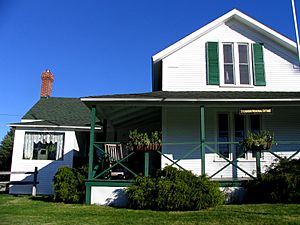
Saranac Lake is a beautiful place with many things for visitors to do. Much of the village is along Lake Flower, which was created by a dam on the Saranac River.
You can go canoeing and boating on the lakes and rivers. There are also many trails for hiking and climbing. In the summer, the village has free concerts in Riverside Park and Berkeley Green. Camping is also very popular in the Saranac Lake area.
Winter Carnival
In winter, people enjoy cross-country and downhill skiing, snowshoeing, ice skating, and snowmobiling. Saranac Lake is famous for its annual 10-day winter carnival, which has been held since 1897! Each year, the carnival has a different theme, like "Adirondack Wildlife."
The carnival's main attraction is the amazing ice palace. It's built with huge blocks of ice taken from Lake Flower and lit up with colorful lights. There are also parades, with marching bands and funny groups like the "Lawn Chair Ladies." Each year, a Winter Carnival King and Queen are chosen from local residents who have helped the community.
Arts and Culture
Saranac Lake has many art galleries and the only year-round professional theater in the Adirondacks. There are also monthly art walks and a Plein Air festival, where artists paint outdoors. The group Saranac Lake ArtWorks includes many local artists and art businesses.
Historic Saranac Lake is a group that works to protect the village's old buildings. They have restored Dr. Edward Livingston Trudeau's old Saranac Laboratory, which is now a museum.
The Adirondack Carousel is a special indoor carousel. All the animals on the carousel are Adirondack wildlife, like whitetail deer, moose, loon, bobcat, trout, otter, and even a black fly! Local artists carved and painted them.
Famous Artists Who Lived Here
- The famous composer Béla Bartók spent summers in Saranac Lake and wrote some of his best music there.
- The writer Robert Louis Stevenson (who wrote Treasure Island) spent a winter in a cottage in Saranac Lake in 1887. His cottage is now a museum.
- The cartoonist Garry Trudeau, who draws the Doonesbury comic strip, grew up in Saranac Lake. He is the great-grandson of Dr. Edward Trudeau.
How Saranac Lake Gets Around
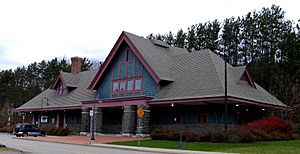
- The Adirondack Regional Airport (SLK) is about 7.3 miles (11.7 km) northwest of the village. It has flights to New York City and Boston.
- Adirondack Trailways buses serve Saranac Lake, connecting it to the Greyhound Lines bus system.
- There is also local bus service and taxi services.
- The Adirondack Scenic Railroad used to run tourist trains from the village to Lake Placid. However, train operations stopped in 2017. Now, parts of the old railway are being turned into a walking and biking trail.
Geography of Saranac Lake
Saranac Lake is located at 44°19′34″N 74°7′51″W / 44.32611°N 74.13083°W. The village has a total area of about 3.0 square miles (7.8 square kilometers). Most of this is land, with a small amount of water.
The village is where the towns of North Elba and St. Armand (in Essex County) meet Harrietstown (in Franklin County).
Major roads like New York State Route 3 and New York State Route 86 cross in the village. The closest big city is Montreal, Quebec, Canada, about 103 miles (166 km) to the north. Plattsburgh is 50 miles (80 km) northeast, and Albany is 148 miles (238 km) south.
Climate
Saranac Lake has a climate with warm summers and cold, snowy winters. It is known for its very cold winters. The average annual snowfall is between 100 and 125 inches (254 and 318 cm).
| Climate data for Saranac Lake Airport, New York (1,663 ft or 507 m AMSL), 1991–2020 normals, extremes 1903–present | |||||||||||||
|---|---|---|---|---|---|---|---|---|---|---|---|---|---|
| Month | Jan | Feb | Mar | Apr | May | Jun | Jul | Aug | Sep | Oct | Nov | Dec | Year |
| Record high °F (°C) | 62 (17) |
65 (18) |
79 (26) |
89 (32) |
94 (34) |
101 (38) |
99 (37) |
97 (36) |
92 (33) |
86 (30) |
75 (24) |
64 (18) |
101 (38) |
| Mean maximum °F (°C) | 49.0 (9.4) |
48.7 (9.3) |
58.2 (14.6) |
74.6 (23.7) |
83.8 (28.8) |
86.7 (30.4) |
87.3 (30.7) |
86.0 (30.0) |
83.3 (28.5) |
74.7 (23.7) |
62.5 (16.9) |
51.3 (10.7) |
89.3 (31.8) |
| Mean daily maximum °F (°C) | 24.9 (−3.9) |
27.6 (−2.4) |
36.5 (2.5) |
50.3 (10.2) |
64.4 (18.0) |
72.4 (22.4) |
76.6 (24.8) |
74.7 (23.7) |
67.9 (19.9) |
54.3 (12.4) |
41.7 (5.4) |
30.2 (−1.0) |
51.8 (11.0) |
| Daily mean °F (°C) | 13.6 (−10.2) |
15.3 (−9.3) |
24.1 (−4.4) |
38.2 (3.4) |
50.5 (10.3) |
59.4 (15.2) |
63.6 (17.6) |
61.7 (16.5) |
54.4 (12.4) |
43.3 (6.3) |
31.9 (−0.1) |
20.7 (−6.3) |
39.7 (4.3) |
| Mean daily minimum °F (°C) | 2.3 (−16.5) |
2.9 (−16.2) |
11.6 (−11.3) |
26.0 (−3.3) |
36.5 (2.5) |
46.3 (7.9) |
50.7 (10.4) |
48.7 (9.3) |
41.0 (5.0) |
32.3 (0.2) |
22.1 (−5.5) |
11.2 (−11.6) |
27.6 (−2.4) |
| Mean minimum °F (°C) | −25.4 (−31.9) |
−22.5 (−30.3) |
−14.5 (−25.8) |
9.7 (−12.4) |
22.5 (−5.3) |
31.7 (−0.2) |
38.6 (3.7) |
35.4 (1.9) |
25.9 (−3.4) |
17.6 (−8.0) |
0.6 (−17.4) |
−15.2 (−26.2) |
−28.8 (−33.8) |
| Record low °F (°C) | −46 (−43) |
−44 (−42) |
−35 (−37) |
−10 (−23) |
10 (−12) |
22 (−6) |
29 (−2) |
27 (−3) |
15 (−9) |
2 (−17) |
−21 (−29) |
−46 (−43) |
−46 (−43) |
| Average precipitation inches (mm) | 1.94 (49) |
1.50 (38) |
2.04 (52) |
3.09 (78) |
3.70 (94) |
4.36 (111) |
4.06 (103) |
3.56 (90) |
3.47 (88) |
3.85 (98) |
2.84 (72) |
2.20 (56) |
36.61 (929) |
| Average snowfall inches (cm) | 25.2 (64) |
22.9 (58) |
19.6 (50) |
9.0 (23) |
1.2 (3.0) |
0.0 (0.0) |
0.0 (0.0) |
0.0 (0.0) |
0.1 (0.25) |
1.9 (4.8) |
14.5 (37) |
24.7 (63) |
119.1 (303.05) |
| Average precipitation days (≥ 0.01 in) | 14.4 | 13.0 | 14.0 | 15.6 | 15.3 | 16.6 | 15.9 | 16.5 | 13.1 | 16.4 | 15.9 | 17.6 | 184.3 |
| Average snowy days (≥ 0.1 in) | 13.8 | 12.0 | 9.6 | 4.7 | 0.7 | 0.0 | 0.0 | 0.0 | 0.1 | 1.4 | 7.7 | 13.2 | 63.2 |
| Source 1: NOAA | |||||||||||||
| Source 2: National Weather Service (snow/snow days/snow depth 1903–1998) | |||||||||||||
Plants and Animals
Saranac Lake is in an area with lots of trees, mostly Hardwoods and Spruce trees. The spring flowers usually bloom around May 11, and the leaves change color in the fall around October 1.
Sister Cities
Saranac Lake has two sister cities, which means they have special friendly relationships:
Images for kids
-
The village of Saranac Lake, bottom, with Lower Saranac Lake, above, from Baker Mountain. Lake Flower is at lower left.
-
The Saranac River runs through the village.
See also
 In Spanish: Saranac Lake para niños
In Spanish: Saranac Lake para niños
 | Charles R. Drew |
 | Benjamin Banneker |
 | Jane C. Wright |
 | Roger Arliner Young |


